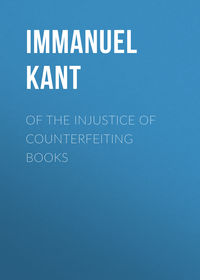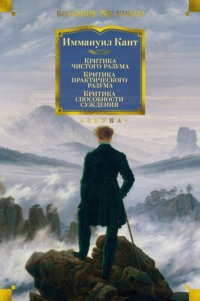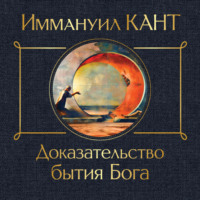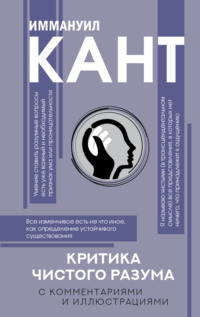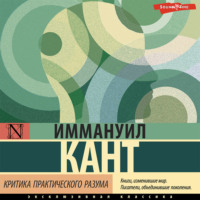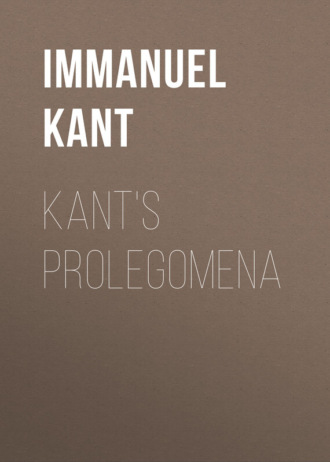 полная версия
полная версияKant's Prolegomena
Hence the Categories seem to have a deeper meaning and import than can be exhausted by their empirical use, and so the understanding inadvertently adds for itself to the house of experience a much more extensive wing, which it fills with nothing but creatures of thought, without ever observing that it has transgressed with its otherwise lawful concepts the bounds of their use.
§ 34. Two important, and even indispensable, though very dry, investigations had therefore become indispensable in the Critique of Pure Reason, – viz., the two chapters "Vom Schematismus der reinen Verstandsbegriffe," and "Vom Grunde der Unterscheidung aller Verstandesbegriffe überhaupt in Phänomena und Noumena." In the former it is shown, that the senses furnish not the pure concepts of the understanding in concreto, but only the schedule for their use, and that the object conformable to it occurs only in experience (as the product of the understanding from materials of the sensibility). In the latter it is shown, that, although our pure concepts of the understanding and our principles are independent of experience, and despite of the apparently greater sphere of their use, still nothing whatever can be thought by them beyond the field of experience, because they can do nothing but merely determine the logical form of the judgment relatively to given intuitions. But as there is no intuition at all beyond the field of the sensibility, these pure concepts, as they cannot possibly be exhibited in concreto, are void of all meaning; consequently all these noumena, together with their complex, the intelligible world,20 are nothing but representation of a problem, of which the object in itself is possible, but the solution, from the nature of our understanding, totally impossible. For our understanding is not a faculty of intuition, but of the connexion of given intuitions in experience. Experience must therefore contain all the objects for our concepts; but beyond it no concepts have any significance, as there is no intuition that might offer them a foundation.
§ 35. The imagination may perhaps be forgiven for occasional vagaries, and for not keeping carefully within the limits of experience, since it gains life and vigor by such flights, and since it is always easier to moderate its boldness, than to stimulate its languor. But the understanding which ought to think can never be forgiven for indulging in vagaries; for we depend upon it alone for assistance to set bounds, when necessary, to the vagaries of the imagination.
But the understanding begins its aberrations very innocently and modestly. It first elucidates the elementary cognitions, which inhere in it prior to all experience, but yet must always have their application in experience. It gradually drops these limits, and what is there to prevent it, as it has quite freely derived its principles from itself? And then it proceeds first to newly-imagined powers in nature, then to beings, outside nature; in short to a world, for whose construction the materials cannot be wanting, because fertile fiction furnishes them abundantly, and though not confirmed, is never refuted, by experience. This is the reason that young thinkers are so partial to metaphysics of the truly dogmatical kind, and often sacrifice to it their time and their talents, which might be otherwise better employed.
But there is no use in trying to moderate these fruitless endeavors of pure reason by all manner of cautions as to the difficulties of solving questions so occult, by complaints of the limits of our reason, and by degrading our assertions into mere conjectures. For if their impossibility is not distinctly shown, and reason's cognition of its own essence does not become a true science, in which the field of its right use is distinguished, so to say, with mathematical certainty from that of its worthless and idle use, these fruitless efforts will never be abandoned for good.
§ 36. How is Nature itself possible? This question – the highest point that transcendental philosophy can ever reach, and to which, as its boundary and completion, it must proceed – properly contains two questions.
First: How is nature at all possible in the material sense, by intuition, considered as the totality of appearances; how are space, time, and that which fills both – the object of sensation, in general possible? The answer is: By means of the constitution of our Sensibility, according to which it is specifically affected by objects, which are in themselves unknown to it, and totally distinct from those phenomena. This answer is given in the Critique itself in the transcendental Aesthetic, and in these Prolegomena by the solution of the first general problem.
Secondly: How is nature possible in the formal sense, as the totality of the rules, under which all phenomena must come, in order to be thought as connected in experience? The answer must be this: It is only possible by means of the constitution of our Understanding, according to which all the above representations of the sensibility are necessarily referred to a consciousness, and by which the peculiar way in which we think (viz., by rules), and hence experience also, are possible, but must be clearly distinguished from an insight into the objects in themselves. This answer is given in the Critique itself in the transcendental Logic, and in these Prolegomena, in the course of the solution of the second main problem.
But how this peculiar property of our sensibility itself is possible, or that of our understanding and of the apperception which is necessarily its basis and that of all thinking, cannot be further analysed or answered, because it is of them that we are in need for all our answers and for all our thinking about objects.
There are many laws of nature, which we can only know by means of experience; but conformity to law in the connexion of appearances, i.e., in nature in general, we cannot discover by any experience, because experience itself requires laws which are a priori at the basis of its possibility.
The possibility of experience in general is therefore at the same time the universal law of nature, and the principles of the experience are the very laws of nature. For we do not know nature but as the totality of appearances, i.e., of representations in us, and hence we can only derive the laws of its connexion from the principles of their connexion in us, that is, from the conditions of their necessary union in consciousness, which constitutes the possibility of experience.
Even the main proposition expounded throughout this section – that universal laws of nature can be distinctly cognised a priori– leads naturally to the proposition: that the highest legislation of nature must lie in ourselves, i.e., in our understanding, and that we must not seek the universal laws of nature in nature by means of experience, but conversely must seek nature, as to its universal conformity to law, in the conditions of the possibility of experience, which lie in our sensibility and in our understanding. For how were it otherwise possible to know a priori these laws, as they are not rules of analytical cognition, but truly synthetical extensions of it?
Such a necessary agreement of the principles of possible experience with the laws of the possibility of nature, can only proceed from one of two reasons: either these laws are drawn from nature by means of experience, or conversely nature is derived from the laws of the possibility of experience in general, and is quite the same as the mere universal conformity to law of the latter. The former is self-contradictory, for the universal laws of nature can and must be cognised a priori (that is, independent of all experience), and be the foundation of all empirical use of the understanding; the latter alternative therefore alone remains.21
But we must distinguish the empirical laws of nature, which always presuppose particular perceptions, from the pure or universal laws of nature, which, without being based on particular perceptions, contain merely the conditions of their necessary union in experience. In relation to the latter, nature and possible experience are quite the same, and as the conformity to law here depends upon the necessary connexion of appearances in experience (without which we cannot cognise any object whatever in the sensible world), consequently upon the original laws of the understanding, it seems at first strange, but is not the less certain, to say:
The understanding does not derive its laws (a priori) from, but prescribes them to, nature.
§ 37. We shall illustrate this seemingly bold proposition by an example, which will show, that laws, which we discover in objects of sensuous intuition (especially when these laws are cognised as necessary), are commonly held by us to be such as have been placed there by the understanding, in spite of their being similar in all points to the laws of nature, which we ascribe to experience.
§ 38. If we consider the properties of the circle, by which this figure combines so many arbitrary determinations of space in itself, at once in a universal rule, we cannot avoid attributing a constitution (eine Natur) to this geometrical thing. Two right lines, for example, which intersect one another and the circle, howsoever they may be drawn, are always divided so that the rectangle constructed with the segments of the one is equal to that constructed with the segments of the other. The question now is: Does this law lie in the circle or in the understanding, that is, Does this figure, independently of the understanding, contain in itself the ground of the law, or does the understanding, having constructed according to its concepts (according to the quality of the radii) the figure itself, introduce into it this law of the chords cutting one another in geometrical proportion? When we follow the proofs of this law, we soon perceive, that it can only be derived from the condition on which the understanding founds the construction of this figure, and which is that of the equality of the radii. But, if we enlarge this concept, to pursue further the unity of various properties of geometrical figures under common laws, and consider the circle as a conic section, which of course is subject to the same fundamental conditions of construction as other conic sections, we shall find that all the chords which intersect within the ellipse, parabola, and hyperbola, always intersect so that the rectangles of their segments are not indeed equal, but always bear a constant ratio to one another. If we proceed still farther, to the fundamental laws of physical astronomy, we find a physical law of reciprocal attraction diffused over all material nature, the rule of which is: "that it decreases inversely as the square of the distance from each attracting point, i.e., as the spherical surfaces increase, over which this force spreads," which law seems to be necessarily inherent in the very nature of things, and hence is usually propounded as cognisable a priori. Simple as the sources of this law are, merely resting upon the relation of spherical surfaces of different radii, its consequences are so valuable with regard to the variety of their agreement and its regularity, that not only are all possible orbits of the celestial bodies conic sections, but such a relation of these orbits to each other results, that no other law of attraction, than that of the inverse square of the distance, can be imagined as fit for a cosmical system.
Here accordingly is a nature that rests upon laws which the understanding cognises a priori, and chiefly from the universal principles of the determination of space. Now I ask:
Do the laws of nature lie in space, and does the understanding learn them by merely endeavoring to find out the enormous wealth of meaning that lies in space; or do they inhere in the understanding and in the way in which it determines space according to the conditions of the synthetical unity in which its concepts are all centred?
Space is something so uniform and as to all particular properties so indeterminate, that we should certainly not seek a store of laws of nature in it. Whereas that which determines space to assume the form of a circle or the figures of a cone and a sphere, is the understanding, so far as it contains the ground of the unity of their constructions.
The mere universal form of intuition, called space, must therefore be the substratum of all intuitions determinable to particular objects, and in it of course the condition of the possibility and of the variety of these intuitions lies. But the unity of the objects is entirely determined by the understanding, and on conditions which lie in its own nature; and thus the understanding is the origin of the universal order of nature, in that it comprehends all appearances under its own laws, and thereby first constructs, a priori, experience (as to its form), by means of which whatever is to be cognised only by experience, is necessarily subjected to its laws. For we are not now concerned with the nature of things in themselves, which is independent of the conditions both of our sensibility and our understanding, but with nature, as an object of possible experience, and in this case the understanding, whilst it makes experience possible, thereby insists that the sensuous world is either not an object of experience at all, or must be nature [viz., an existence of things, determined according to universal laws22].
APPENDIX TO THE PURE SCIENCE OF NATURE§ 39. Of the System of the CategoriesThere can be nothing more desirable to a philosopher, than to be able to derive the scattered multiplicity of the concepts or the principles, which had occurred to him in concrete use, from a principle a priori, and to unite everything in this way in one cognition. He formerly only believed that those things, which remained after a certain abstraction, and seemed by comparison among one another to constitute a particular kind of cognitions, were completely collected; but this was only an Aggregate. Now he knows, that just so many, neither more nor less, can constitute the mode of cognition, and perceives the necessity of his division, which constitutes comprehension; and now only he has attained a System.
To search in our daily cognition for the concepts, which do not rest upon particular experience, and yet occur in all cognition of experience, where they as it were constitute the mere form of connexion, presupposes neither greater reflexion nor deeper insight, than to detect in a language the rules of the actual use of words generally, and thus to collect elements for a grammar. In fact both researches are very nearly related, even though we are not able to give a reason why each language has just this and no other formal constitution, and still less why an exact number of such formal determinations in general are found in it.
Aristotle collected ten pure elementary concepts under the name of Categories.23 To these, which are also called predicaments, he found himself obliged afterwards to add five post-predicaments,24 some of which however (prius, simul, and motus) are contained in the former; but this random collection must be considered (and commended) as a mere hint for future inquirers, not as a regularly developed idea, and hence it has, in the present more advanced state of philosophy, been rejected as quite useless.
After long reflexion on the pure elements of human knowledge (those which contain nothing empirical), I at last succeeded in distinguishing with certainty and in separating the pure elementary notions of the Sensibility (space and time) from those of the Understanding. Thus the 7th, 8th, and 9th Categories had to be excluded from the old list. And the others were of no service to me; because there was no principle [in them], on which the understanding could be investigated, measured in its completion, and all the functions, whence its pure concepts arise, determined exhaustively and with precision.
But in order to discover such a principle, I looked about for an act of the understanding which comprises all the rest, and is distinguished only by various modifications or phases, in reducing the multiplicity of representation to the unity of thinking in general: I found this act of the understanding to consist in judging. Here then the labors of the logicians were ready at hand, though not yet quite free from defects, and with this help I was enabled to exhibit a complete table of the pure functions of the understanding, which are however undetermined in regard to any object. I finally referred these functions of judging to objects in general, or rather to the condition of determining judgments as objectively valid, and so there arose the pure concepts of the understanding, concerning which I could make certain, that these, and this exact number only, constitute our whole cognition of things from pure understanding. I was justified in calling them by their old name, Categories, while I reserved for myself the liberty of adding, under the title of "Predicables," a complete list of all the concepts deducible from them, by combinations whether among themselves, or with the pure form of the appearance, i.e., space or time, or with its matter, so far as it is not yet empirically determined (viz., the object of sensation in general), as soon as a system of transcendental philosophy should be completed with the construction of which I am engaged in the Critique of Pure Reason itself.
Now the essential point in this system of Categories, which distinguishes it from the old rhapsodical collection without any principle, and for which alone it deserves to be considered as philosophy, consists in this: that by means of it the true significance of the pure concepts of the understanding and the condition of their use could be precisely determined. For here it became obvious that they are themselves nothing but logical functions, and as such do not produce the least concept of an object, but require some sensuous intuition as a basis. They therefore only serve to determine empirical judgments, which are otherwise undetermined and indifferent as regards all functions of judging, relatively to these functions, thereby procuring them universal validity, and by means of them making judgments of experience in general possible.
Such an insight into the nature of the categories, which limits them at the same time to the mere use of experience, never occurred either to their first author, or to any of his successors; but without this insight (which immediately depends upon their derivation or deduction), they are quite useless and only a miserable list of names, without explanation or rule for their use. Had the ancients ever conceived such a notion, doubtless the whole study of the pure rational knowledge, which under the name of metaphysics has for centuries spoiled many a sound mind, would have reached us in quite another shape, and would have enlightened the human understanding, instead of actually exhausting it in obscure and vain speculations, thereby rendering it unfit for true science.
This system of categories makes all treatment of every object of pure reason itself systematic, and affords a direction or clue how and through what points of inquiry every metaphysical consideration must proceed, in order to be complete; for it exhausts all the possible movements (momenta) of the understanding, among which every concept must be classed. In like manner the table of Principles has been formulated, the completeness of which we can only vouch for by the system of the categories. Even in the division of the concepts,25 which must go beyond the physical application of the understanding, it is always the very same clue, which, as it must always be determined a priori by the same fixed points of the human understanding, always forms a closed circle. There is no doubt that the object of a pure conception either of the understanding or of reason, so far as it is to be estimated philosophically and on a priori principles, can in this way be completely cognised. I could not therefore omit to make use of this clue with regard to one of the most abstract ontological divisions, viz., the various distinctions of "the notions of something and of nothing," and to construct accordingly (Critique, p. 207) a regular and necessary table of their divisions.26
And this system, like every other true one founded on a universal principle, shows its inestimable value in this, that it excludes all foreign concepts, which might otherwise intrude among the pure concepts of the understanding, and determines the place of every cognition. Those concepts, which under the name of "concepts of reflexion" have been likewise arranged in a table according to the clue of the categories, intrude, without having any privilege or title to be among the pure concepts of the understanding in Ontology. They are concepts of connexion, and thereby of the objects themselves, whereas the former are only concepts of a mere comparison of concepts already given, hence of quite another nature and use. By my systematic division27 they are saved from this confusion. But the value of my special table of the categories will be still more obvious, when we separate the table of the transcendental concepts of Reason from the concepts of the understanding. The latter being of quite another nature and origin, they must have quite another form than the former. This so necessary separation has never yet been made in any system of metaphysics for, as a rule, these rational concepts all mixed up with the categories, like children of one family, which confusion was unavoidable in the absence of a definite system of categories.
THIRD PART OF THE MAIN TRANSCENDENTAL PROBLEM
HOW IS METAPHYSICS IN GENERAL POSSIBLE?
§ 40. PURE mathematics and pure science of nature had no occasion for such a deduction, as we have made of both, for their own safety and certainty. For the former rests upon its own evidence; and the latter (though sprung from pure sources of the understanding) upon experience and its thorough confirmation. Physics cannot altogether refuse and dispense with the testimony of the latter; because with all its certainty, it can never, as philosophy, rival mathematics. Both sciences therefore stood in need of this inquiry, not for themselves, but for the sake of another science, metaphysics.
Metaphysics has to do not only with concepts of nature, which always find their application in experience, but also with pure rational concepts, which never can be given in any possible experience. Consequently the objective reality of these concepts (viz., that they are not mere chimeras), and the truth or falsity of metaphysical assertions, cannot be discovered or confirmed by any experience. This part of metaphysics however is precisely what constitutes its essential end, to which the rest is only a means, and thus this science is in need of such a deduction for its own sake. The third question now proposed relates therefore as it were to the root and essential difference of metaphysics, i.e., the occupation of Reason with itself, and the supposed knowledge of objects arising immediately from this incubation of its own concepts, without requiring, or indeed being able to reach that knowledge through, experience.28
Without solving this problem reason never is justified. The empirical use to which reason limits the pure understanding, does not fully satisfy the proper destination of the latter. Every single experience is only a part of the whole sphere of its domain, but the absolute totality of all possible experience is itself not experience. Yet it is a necessary [concrete] problem for reason, the mere representation of which requires concepts quite different from the categories, whose use is only immanent, or refers to experience, so far as it can be given. Whereas the concepts of reason aim at the completeness, i.e., the collective unity of all possible experience, and thereby transcend every given experience. Thus they become transcendent.
As the understanding stands in need of categories for experience, reason contains in itself the source of ideas, by which I mean necessary concepts, whose object cannot be given in any experience. The latter are inherent in the nature of reason, as the former are in that of the understanding. While the former carry with them an illusion likely to mislead, the illusion of the latter is inevitable, though it certainly can be kept from misleading us.



